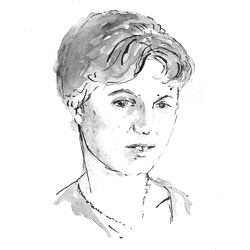Sylvia Plath
Sylvia Plath was born in Boston, USA on 27 October 1932, the daughter of Otto Plath (an immigrant from Germany) and Aurelia Frances Schober. She was a precocious literary talent: her first poem was published when she was only eight, and she had published a short story before going to Smith College, one of the most prestigious universities for women. Her writing and academic success continued there, but she also began to suffer from depression. This period of her life formed the basis of her novel The Bell Jar. After graduating from Smith she was awarded a Fulbright Scholarship to study English at Newnham College, Cambridge from 1955 until 1957. During her first year she met Ted Hughes and after a few passionate months, some spent apart, they were married in June 1956. Her second year in Cambridge passed happily, living with Hughes and writing, and in 1957 she was given a teaching job back at Smith. In 1958, however, she and Hughes moved to Boston where he taught and she tried to write. She also worked as a secretary in a psychiatric clinic, and herself suffered from worsening depression, an experience which lay behind her story 'Johnny Panic and the Bible of Dreams'. During 1959 she worked with poets Robert Lowell and Anne Sexton, which stimulated her writing again. In December 1959 she and Hughes moved back to London. Their daughter Frieda was born in April 1960, and their son, Nicholas, was born in January 1962. During these years most of Plath's best-known poems, including 'Daddy', 'Lesbos', 'Lady Lazarus' and 'Getting There' were written, and she finished The Bell Jar. Her marriage was breaking apart, however, and her depression was becoming even worse. On 11th February, 1963, Plath committed suicide.
Her life and her work are intimately connected, and not only in that there are numerous autobiographical elements in her writing. Her tragic story has been the starting point for many readers and critics, sometimes to the extent that interpretation of her work has been swamped by people seeking to take sides in interpreting her life. Nonetheless her work is brilliant, intimate, and cut off, as she was. Her novel The Bell Jar and her poems complement one another in their intense opening-up of personal experience.
The key Plath resource on this site is an examination of her work in the light of her academic experience in Cambridge. She studied the Tragedy paper - a cornerstone of the course from the very start - and resonances with the material she read for it can be identified in her writing.
